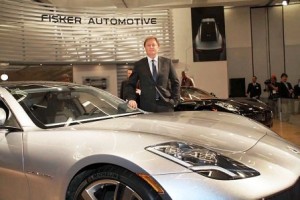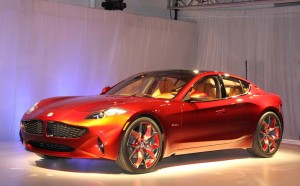Forced out earlier this year after a disagreement over management policies, Fisker Automotive founder Henrik Fisker is hoping to regain control of the struggling maker of plug-in hybrid vehicles which is expected to file bankruptcy unless it can quickly find a White Knight to cover its mounting debts.
Henrik Fisker, who first made his name as an automotive designer, is reportedly teaming up with Hong Kong billionaire Richard Li – an early investor in Fisker Automotive. While Fisker was not immediately available to comment, reports on the Reuters news service indicate they would like to take over the automaker without forcing it into bankruptcy.
They would be one of several groups company insiders say are interested in taking over Fisker Automotive which launched sales of its Karma plug-in hybrid vehicle early last year. Among the others, former General Motors “car czar” Bob Lutz has teamed up with a Chinese automotive supplier to place a $20 million bid for Fisker post-bankruptcy.
Based in Southern California, Fisker debuted with much expectations, a stable of high-powered executive with extensive experience in the auto industry, and a plug-in hybrid sedan – the Karma – that won raves for its sleek, sports car-like styling.
(Israeli-based battery car venture Project Better Place fails. Click Here for the story.)
The maker also appeared to have significant funding, including an estimated $1.2 billion in private equity and a $529 million low-interest loan from the Department of Energy. But the Karma came to market late, leading the DoE to freeze the loan after Fisker had only drawn down $171 million. Meanwhile, the plug-in sedan ran into a series of problems, including a recall for a cooling fan that could cause a vehicle fire. Initial reviews were strong but influential Consumer Reports magazine trashed the vehicle for a variety of issues.
Sales ran well below expectations and the maker soon found itself short of cash needed to finish development of its second, more mainstream model, the Atlantic. With its problems mounting, it was forced to halt Karma production and delay the Atlantic program.
(Its first battery car in two decades, GM says Chevrolet Spark will cost $19,995 after federal credits. Click Here.)
This past March, founder Henrik Fisker quit after a fierce debate over spending plans with new CEO Tony Posawatz, the one-time head of the Chevrolet Volt program. Weeks later, Fisker Automotive fired three-quarters of its staff. Called to testify before a U.S. House of Representatives subcommittee, senior Fisker officials confirmed their situation was dire enough bankruptcy was a strong possibility.
That led the DoE to seize $21 million in Fisker funds to partially cover the loan the company owed.
(Tesla to repay $465 million federal loan a decade early. Click Here for the full story.)
Prior to the mass firings, Fisker officials were frantically negotiating with several potential suitors, some interested in funding the company for an equity stake, others looking for an outright purchase. The bidders backed off, however, after the depths of Fisker Automotive’s financial problems became apparent.
But with the maker hiring a legal team to advise it on bankruptcy options, new bidders have begun to circle looking at their options.
The bid by Lutz – who initially conceived of what became the Chevrolet Volt – and China’s Wanxiang Group is dependent upon Fisker filing for Chapter 11.
Henrik Fisker’s offer would apparently help the company he founded avoid bankruptcy. According to the Reuters report, the offer would involve purchasing the outstanding DoE loan. But there are significant additional debts that Fisker faces that would have to be covered or renegotiated.
And the Fisker-Li bid would have to have enough financial backing to be able to resume development of the Fisker Atlantic. The $103,000 Karma was always seen as a low-volume entry into the nascent electric vehicle market. It would take the launch of a vehicle at less than half that price to generate enough sales to eventually push the troubled maker into the black.
It has been a tough time for battery-car pioneers. Israeli-based Project Better Place, which had hoped to promote the concept of battery swapping to overcome so-called “range anxiety,” has filed for liquidation. California-based Coda Automotive has gone bankrupt. And a federal bankruptcy judge has approved the plan submitted by battery maker A123, now sold to a Chinese supplier and renamed B456.


